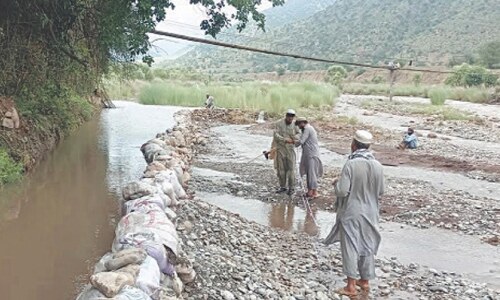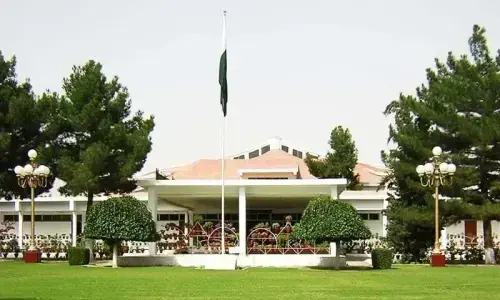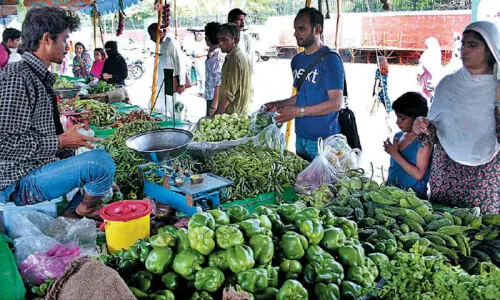Legal controversies regarding distribution of forest royalty continue to surface despite framing of rules in 2005 that provide proper mechanism and recommendations of two inquiry committees in this regard.
Recently, the special judge anti-corruption indicted two assistant commissioners and five private persons for illegal distribution of forest royalty of Rs21.1 million among unauthorised persons.
The accused persons have pleaded not guilty to the charge and decided to stand trial following which the court summoned the prosecution witnesses on March 3, the next date of hearing in the trial.
The present legal battle between royalty holders and accused persons had emerged over four years ago.
The two assistant commissioners, Abdul Wali and Mohammad Farooq, who had served at Sheringal tehsil at the time of alleged occurrence, were earlier granted pre-arrest bail by the court in 2019.
The private accused persons named Abdur Rashid, Ziarat Gul, Altaf Khan, Shireen Zada and Haji Mohammad Shafiq, have also been granted bail by different courts from time to time. The accused persons were indicted on Jan 6.
In the charge-sheet the court states that the accused No 1 and 2 (assistant commissioners) while posted at Sheringal were entrusted royalty amount of Rs21.13 million for distribution among the persons entitled thereto in the light of government policy. However, they by abusing their official position as public servant while sharing common intention and with the collusion of accused No 3 to 7 (private persons) fraudulently and dishonestly embezzled and distributed some of the said royalty amount among unauthorised persons in violation of the government policy and deprived the poor, widows and orphans of their due rights in the royalty by causing wrongful loss to them.
The court charged them of committing an offence punishable under section 409 of Pakistan Penal Code read with section 5(2) of Prevention of Corruption Act.
Such royalty disputes have been surfacing in the faraway forest areas of Upper Dir during last three decades.
The present issue surfaced in 2016 when the complainants had submitted an application to then chief minister Pervez Khattak wherein they had alleged that the private accused persons in collusion with the administrative officers had illegally received royalty of Kalkot forests.
The CM Secretariat referred the said application to KP anti-corruption establishment (ACE) on March 16, 2016. Subsequently, after an inquiry the FIR of the case was registered on Nov 28, 2017, at ACE police station, Upper Dir, against the present seven accused.
The private accused are charged with receiving forest royalty at the behest of large number of royalty rights holders claiming they were attorney holders on behalf of the rights holders also called as royalty concessionists. This claim was denied by people of the area and they had accused these persons of depriving them of their royalty.
The KP Protected Forest Management Rules, 2005 were framed and notified in April 2005. The said Rules provide mechanism for distribution of forest royalty among the rights holders.
Rule 2 (3) provides that the divisional forest officer will issue a cheque in the name of the district revenue officer for the amount of share of the concessionists (royalty holders), out of the sale proceeds. The amount will be distributed by the DRO among the concessionists.
The said rule in clear terms provides that no payment through proxies or holders of power of attorney shall be permissible. The acquaintance roll duly verified by the DRO shall be forwarded to the conservator of forests on each occasion the payment is made. The acquaintance rolls shall be maintained for audit purposes.
The question of royalty is older even than the merger of former State of Dir with Pakistan. On Oct 12, 1963, an agreement was signed between the residents of Dir Kohistan and Nawab of Dir wherein rights of locals were determined according to which 12% share of the sale proceeds of the forest timber was to go to the local rights holders.
Following the merger, a notification was issued on Sept 15, 1972, and the forests situated in Dir district were declared as state property subject to payment of 15% of royalty to the local rights holders whereas forests were termed protected forests.
Later, this royalty was increased from 15% to 60% in case of the said forests through a notification issued on March 14, 1977, in the light of the decision made by then prime minister Zulfikar Ali Bhutto during his visit to Dir.
In past, it remained a practice that royalty was never distributed directly among the inhabitants of the forest areas, but was received by a few forest contractors on the basis of power of attorneys they received from some locals.
That practice gave birth to disputes and the provincial government had twice constituted inquiry committees to look into the matter. One of the inquiry committees, constituted in March 1997, was headed by then district and sessions judge Ziauddin Khattak for determining the right of forest royalty of the inhabitants of Kalkot and Gawaldai valleys of Upper Dir.
The said inquiry committee had declared as illegal the payment of royalty to individuals on basis of power of attorneys. It had also ruled that the royalty paid to inhabitants was not as a right, but as a concession, which was not transferable and as such no one could purchase it under the law.
Another inquiry committee headed by district and sessions judge Hayat Ali Shah had also recommended to the government that new agreements of sale and purchase of the royalty should be disallowed because these were a mean of exploitation of the local rights holders particularly those who were ignorant of their rights.
Some of the royalty holders said that the forest department as well as administrative officers should strictly follow the rules so as to avoid such controversies in future.
Published in Dawn, January 25th, 2021






























